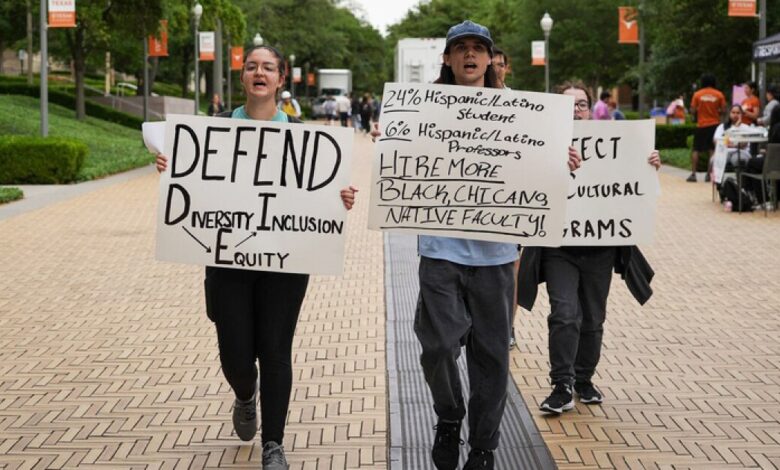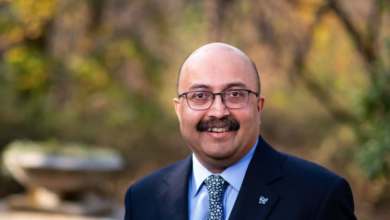Texas Officials Scramble, Advocates Fret Weeks Before DEI Funding Expires

[ad_1]
Texas colleges stand to lose millions of dollars in funding for their diversity, equity, and inclusion programs starting this fall after a sweeping law goes into effect. College officials now are scrambling to figure out which programs to axe, while diversity advocates fret that the law will have an outsized impact on the retention of students of color and funding for federal grants.
Senate Bill 17 bans all DEI offices, programs, and training at public colleges, as well as the use of diversity statements and preferential hiring. It’s among a set of seven similar pieces of legislation that have passed in five states, according to The Chronicle’s DEI legislation tracker.
The law will begin to take hold on September 1, when the state will halt all funding for DEI efforts.
The University of Texas Board of Regents has yet to provide guidelines on how colleges should respond to the law.
Spokespersons at Texas A&M University and the University of Houston said that the universities are evaluating campus practices to comply with the law once it goes into effect. A spokesperson at Sam Houston State University said the college was unable to provide information since the law hasn’t been enacted yet.
“Sam Houston State is the #1 university in Texas for social mobility and welcomes students from all backgrounds. SHSU is proud to be a Hispanic-serving institution and minority-serving institution with a student body that closely reflects the demographics of the Texas population,” the spokesperson said in an email.
Several other colleges didn’t return requests for comment.
Starting on January 1, the law will prohibit colleges from establishing or maintaining a DEI office, or requiring a student or employee to participate in training on “diversity, equity, inclusion, bias, oppression, gender identity, or related concepts.”
It also bans the use of diversity statements in hiring, or requiring students or employees to support an ideology that “promotes the differential treatment of an individual or group of individuals based on race, color, or ethnicity.”
A college also can’t give preferential treatment to a prospective student or job applicant based on their unsolicited statement of race, ethnicity, or support of a specific belief.
If any employee violates the new law after January 1, colleges are required to place the employee on unpaid leave for the first offense and terminate the employee after their second offense. If a college violates the law, it will receive a court order to comply with it.
Advocates of DEI say, considering colleges’ racist past, it’s important for administrators to aggressively recruit students of color and make them feel welcome once they enroll.
Republicans in the state argue that DEI efforts are divisive and discriminatory toward white people and are ineffective.
DEI programs start from the notion that all white people are racist and encourage students to only see the world in relation to colonization and conquest, said Sherry Sylvester, a senior fellow at the Texas Public Policy Foundation, an organization that helped write SB 17. She said the programs create an environment of “fear and adversity.”
“It’s exactly the opposite of what it says,” Sylvester said. “It’s not diverse. It’s prescribed thinking.”
SB 17 faced heated backlash and hours of debate on the House and Senate floors this spring. Alumni, students, faculty, and staff waited hours to testify in public hearings and held protests at the Texas State Capitol.
The final version of the law exempts registered student organizations, teaching, research, guest speakers, health services, and services for veterans and people with physical or cognitive disabilities from the ban.
Even with the exemptions, Karma Chávez, a member of the University of Texas at Austin chapter of the American Association of University Professors’ executive committee, worries the bill will create an environment where professors and students shy away from work they think may get them in trouble. A student group can choose a guest speaker who discusses systemic racism or a professor can research queer theory, but they may choose not to out of fear of repercussions, she said.
“We’re gonna see a space in which students who don’t fit the kind of mold of a traditional university student are not going to have those spaces of belonging,” said Chávez, who is a professor of Mexican American and Latino/a studies. “That’s going to be really damaging for their desire to stay and their ability to get the highest-quality education.”
Predominantly white departments are going to probably get whiter; male departments are probably going to be even more full of men.
Many DEI advocates also worry the exemptions will take away spaces for people in marginalized communities to feel included, such as the Multicultural Engagement Center and the Gender and Sexuality Center at UT Austin.
Chávez is co-president of the Hispanic Faculty/Staff Association but is unsure whether the organization will exist in the fall. The legislation could also prevent students from learning about communities that they aren’t part of unless they seek out specific courses related to race and ethnicity, Chávez said.
“I think it’s a really sad day for education,” she said.
In addition to concerns over campus life for students and faculty, those who support DEI worry SB 17 will have a negative impact on Texas colleges’ competitive edge in applying for state and federal grants. Though colleges can still apply for grants with DEI components, many grant applications require schools to identify how they’ll continue to foster an inclusive campus, which is harder to prove without DEI offices or programs, Chávez said.
Texas is a research “powerhouse,” with colleges drawing much of their funding from state and federal grants, according to a report from the AAUP. The effects could be “potentially catastrophic,” Chávez said.
Though the legality and efficacy of diversity statements have caused widespread debate, Chávez said she worries restricting them could remove accountability in the hiring process. “Predominantly white departments are going to probably get whiter; male departments are probably going to be even more full of men,” she said.
Chávez believes changing the language of DEI efforts won’t necessarily combat how the law might impact campus culture and academic freedom. Though colleges can’t necessarily ban teaching a class about race, administrators won’t prioritize it. And as more anti-DEI advocates push for similar legislation in other states, she worries the federal government may lose sight of diversity efforts or give up on them entirely.
She also predicts that as inclusive spaces shut down and grant money deteriorates, faculty and students targeted in the bill will find schools outside of Texas to attend. While some people can’t leave for financial or familial reasons, her current students have already begun encouraging their younger friends and siblings to seek education outside of the state.
“They’ll be able to find a place that actually values them in a way that Texas universities are saying they don’t,” Chávez said.
Sherry Sylvester argues that diversity, equity, and inclusion programs act as a form of “thought police” that limits what faculty and students are allowed to think or say. Though students in Texas should be learning about its dark history, college campuses should be open spaces for debate and inquiry, she said.
She believes colleges will still find “loopholes” in the law or ways to support DEI efforts without using the specific language outlined in the law. Sylvester encourages people to continue going to college campuses and demonstrating that DEI is “detrimental” to students.
“They’ll hold on for a long time, but I’m confident that we’ll be able to finally eradicate DEI from college campuses,” she said. “It’s a failed education strategy.”
[ad_2]
Source link






